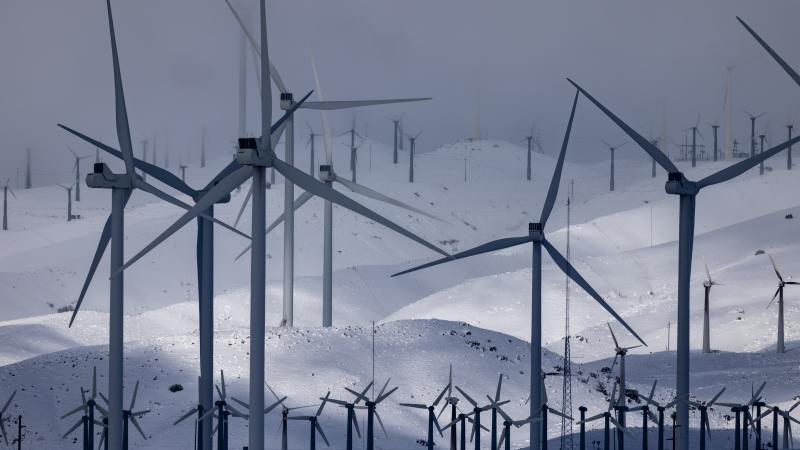Repudiation of Biden LNG exports analysis sets stage for Trump course change on energy
“The study epitomizes four years of misguided energy policy that has consistently undermined American energy independence,” a trade group president declared.
The Biden Energy Department's long-awaited draft analysis on the impacts of liquified natural gas (LNG) exports drew widespread industry repudiation and set the stage now for President-elect Donald Trump to reverse much of his predecessor's energy policies.
The analysis published this week came after President Joe Biden ordered a moratorium on LNG export permits to countries without free-trade agreements, a pause Trump is likely to end.
“The study epitomizes four years of misguided energy policy that has consistently undermined American energy independence,” said Tom Pyle, president of the American Energy Alliance.
Opponents of Biden’s LNG policy have long blasted the science and reasoning for the decision. The LNG “pause,” as supporters called it, has led to multiple congressional hearings.
It’s also brought a wave of litigation. The Liberty Justice Center and Pelican Institute for Public Policy filed lawsuits in May, arguing the ban is unconstitutional.
In July, 16 states also filed a lawsuit, seeking to stay the ban. A federal judge sided with the plaintiffs in July, and the Biden administration appealed the ruling.
However, with the incoming administration expected to overturn Biden’s ban, the Department of Justice filed a motion to halt the legal challenges, arguing they will become moot when Trump takes over in January.
While the study won’t likely deter Trump from pursuing LNG export expansion as part of his American energy dominance plan, according to the New York Times, the study could provide legal arguments for environmentalists who plan to use lawsuits against LNG permits to block European consumers from accessing energy from fossil fuels.
Unfettered energy
The DOE study finds that “unfettered” exports of LNG would increase wholesale domestic natural gas prices by over 30%, costing the average American household well over$100 more per year by 2050. The study also claims that U.S. LNG exports would displace more renewables than they would displace coal, resulting in an increase in greenhouse gas emissions.
Energy Secretary Jennifer Granholm said in a statement that the study proves that “a business-as-usual approach is neither sustainable nor advisable.”
The study also argues that demand for natural gas has “flattened” in Europe, which is a primary consumer of U.S. LNG exports, and demand will decrease as it has in Japan and South Korea. Therefore, existing LNG permits and export capacity is enough for any future global demand.
Critics immediately disputed the study’s findings. “Further attempts by this administration to politicize or distort the impact of US LNG exports should be met with skepticism,” Anne Bradbury, CEO of the American Exploration & Production Council, an industry group, said in a statement.
Supporters of a ban on LNG exports have been arguing for decades that increased exports would drive up domestic prices of natural gas. Over the past decade,however, LNG exports have grown exponentially without any corresponding increase in price.
“We have a decade of data showing that surging LNG exports have not caused any price spikes. Also, because the Internet is forever, we can see countless examples in the past of export critics assuring us in glossy reports and high-profile op-eds that exports would raise prices for consumers,” Steve Everly, senior managing director at FTI consulting, wrote in a post on LinkedIn, which provides several examples of LNG opponents making these claims that so far haven’t proven to be accurate.
S&P Global released its own LNG export analysis Tuesday, which disputes the Biden-Harris administration’s study. According to S&P Global, lifting Biden’s ban on export permits would have a negligible impact on household natural gas costs of less than 1%. However, the industry would contribute $1.3 trillion in gross domestic product and support an average of 495,000 jobs directly and indirectly.
The S&P study is the first phase of a two-part study, and the second phase, which will be released in March 2025, will show the results of a “rigorous emissions analysis.”
Energy expert Tom Shepstone noted on his "Energy Security and Freedom" Substack that, while Granholm expressed certainty in her statements on the report, the report itself uses far more tentative language about its conclusions. Shepstone lists out a few example quotes from the report:
-
Given the global scope and timeframe examined in this study, there should be recognition of the inherent uncertainty in conclusions, especially given their size relative to the overall global economy and energy system.
-
This study is not intended to serve as a forecast of U.S. LNG exports and impacts.
-
A full uncertainty analysis encompassing all underlying factors is beyond the scope of this study.
Helping allies
Critics also dispute the DOE’s continental that Europe’s flattening demand for LNG is an indication of future demand. Shortly after Biden enacted the ban on export permits, energy expert Robert Bryce detailed how high energy costs as a result of Europe’s pursuit of green energy policies is resulting in a collapse of its industries.
Due to a prolonged “wind drought” in Europe, Germany, Denmark and the United Kingdom have been importing increasing amounts of electricity from Norway’s hydroelectric resources. This caused a tremendous spike in electricity costs in Norway, creating a burden for the country’s energy consumers. Norway’s energy minister told the Financial Times that “It’s an absolutely shit situation.” Norway is now considering cutting off Europe from its electricity exports. As the high costs of a transition to renewables weigh more on European households and industries, policies may shift toward greater reliance on natural gas.
Jeff Eshelman, president and CEO of the Independent Petroleum Association of American, an industry group, argued in a statement that LNG exports have reduced the trade deficit, helped allies counter Russian aggression due the decreased dependence on Russian supplies, and provided hundreds of thousands of jobs.
“This thumb-on-the-scale ‘study’ was an election year giveaway to Keep It In the Ground activists, and a thinly veiled attempt to give them a legal tool to sue American industry in the future. We hope the Trump administration will put this disastrous ‘pause’ behind us and allow Americans to get back to work."
The draft now enters a 60-day comment period, meaning by the time it’s finalized, Trump will likely be installed in the White House. While Trump won’t likely put too much stock in the study, well-funded environmentalist organizations are prepared to fight Trump’s energy policies through the courts. Today’s DOE announcement is likely not the last we’ll hear of the study.
The Facts Inside Our Reporter's Notebook
Documents
Links
- President Joe Biden ordered a moratorium
- long blasted the science
- multiple
- Congressional
- hearings
- arguing the ban is unconstitutional
- lawsuit
- sided with the plaintiffs in July
- Biden administration appealed the ruling
- arguing they will become moot
- American energy dominance
- according to the New York Times
- said in a statement
- arguing for decades
- LNG exports have grown exponentially
- corresponding increase in price
- wrote in a post on LinkedIn
- released its own LNG export analysis
- Energy Security and Freedom
- resulting in a collapse of its industries
- told the Financial Times
- enters a 60-day comment period
- well-funded environmentalist organizations
















